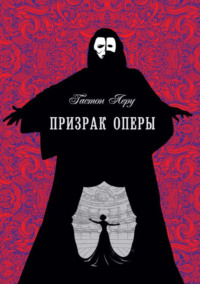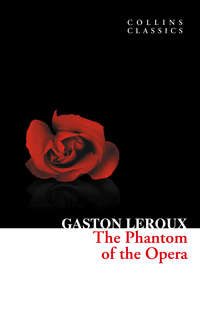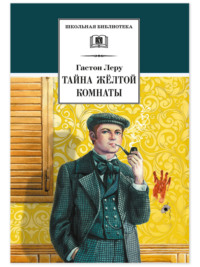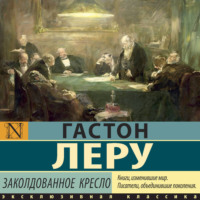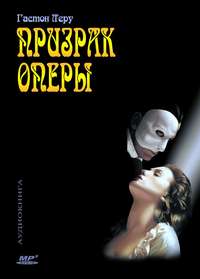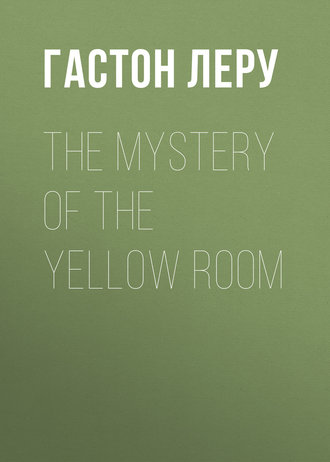 полная версия
полная версияThe Mystery of the Yellow Room
“Bah!” cried Rouletabille, “the murderer was wounded in the hand by Mademoiselle Stangerson’s revolver!”
“Ah!—a simply instinctive observation! Take care!—You are becoming too strictly logical, Monsieur Rouletabille; logic will upset you if you use it indiscriminately. You are right, when you say that Mademoiselle Stangerson fired her revolver, but you are wrong when you say that she wounded the murderer in the hand.”
“I am sure of it,” cried Rouletabille.
Fred, imperturbable, interrupted him:
“Defective observation—defective observation!—the examination of the handkerchief, the numberless little round scarlet stains, the impression of drops which I found in the tracks of the footprints, at the moment when they were made on the floor, prove to me that the murderer was not wounded at all. Monsieur Rouletabille, the murderer bled at the nose!”
The great Fred spoke quite seriously. However, I could not refrain from uttering an exclamation.
The reporter looked gravely at Fred, who looked gravely at him. And Fred immediately concluded:
“The man allowed the blood to flow into his hand and handkerchief, and dried his hand on the wall. The fact is highly important,” he added, “because there is no need of his being wounded in the hand for him to be the murderer.”
Rouletabille seemed to be thinking deeply. After a moment he said:
“There is something—a something, Monsieur Frederic Larsan, much graver than the misuse of logic the disposition of mind in some detectives which makes them, in perfect good faith, twist logic to the necessities of their preconceived ideas. You, already, have your idea about the murderer, Monsieur Fred. Don’t deny it; and your theory demands that the murderer should not have been wounded in the hand, otherwise it comes to nothing. And you have searched, and have found something else. It’s dangerous, very dangerous, Monsieur Fred, to go from a preconceived idea to find the proofs to fit it. That method may lead you far astray Beware of judicial error, Monsieur Fred, it will trip you up!”
And laughing a little, in a slightly bantering tone, his hands in his pockets, Rouletabille fixed his cunning eyes on the great Fred.
Frederic Larsan silently contemplated the young reporter who pretended to be as wise as himself. Shrugging his shoulders, he bowed to us and moved quickly away, hitting the stones on his path with his stout cane.
Rouletabille watched his retreat, and then turned toward us, his face joyous and triumphant.
“I shall beat him!” he cried. “I shall beat the great Fred, clever as he is; I shall beat them all!”
And he danced a double shuffle. Suddenly he stopped. My eyes followed his gaze; they were fixed on Monsieur Robert Darzac, who was looking anxiously at the impression left by his feet side by side with the elegant footmarks. There was not a particle of difference between them!
We thought he was about to faint. His eyes, bulging with terror, avoided us, while his right hand, with a spasmodic movement, twitched at the beard that covered his honest, gentle, and now despairing face. At length regaining his self-possession, he bowed to us, and remarking, in a changed voice, that he was obliged to return to the chateau, left us.
“The deuce!” exclaimed Rouletabille.
He, also, appeared to be deeply concerned. From his pocket-book he took a piece of white paper as I had seen him do before, and with his scissors, cut out the shape of the neat bootmarks that were on the ground. Then he fitted the new paper pattern with the one he had previously made—the two were exactly alike. Rising, Rouletabille exclaimed again: “The deuce!” Presently he added: “Yet I believe Monsieur Robert Darzac to be an honest man.” He then led me on the road to the Donjon Inn, which we could see on the highway, by the side of a small clump of trees.
CHAPTER X. “We Shall Have to Eat Red Meat—Now”
The Donjon Inn was of no imposing appearance; but I like these buildings with their rafters blackened with age and the smoke of their hearths—these inns of the coaching-days, crumbling erections that will soon exist in the memory only. They belong to the bygone days, they are linked with history. They make us think of the Road, of those days when highwaymen rode.
I saw at once that the Donjon Inn was at least two centuries old—perhaps older. Under its sign-board, over the threshold, a man with a crabbed-looking face was standing, seemingly plunged in unpleasant thought, if the wrinkles on his forehead and the knitting of his brows were any indication.
When we were close to him, he deigned to see us and asked us, in a tone anything but engaging, whether we wanted anything. He was, no doubt, the not very amiable landlord of this charming dwelling-place. As we expressed a hope that he would be good enough to furnish us with a breakfast, he assured us that he had no provisions, regarding us, as he said this, with a look that was unmistakably suspicious.
“You may take us in,” Rouletabille said to him, “we are not policemen.”
“I’m not afraid of the police—I’m not afraid of anyone!” replied the man.
I had made my friend understand by a sign that we should do better not to insist; but, being determined to enter the inn, he slipped by the man on the doorstep and was in the common room.
“Come on,” he said, “it is very comfortable here.”
A good fire was blazing in the chimney, and we held our hands to the warmth it sent out; it was a morning in which the approach of winter was unmistakable. The room was a tolerably large one, furnished with two heavy tables, some stools, a counter decorated with rows of bottles of syrup and alcohol. Three windows looked out on to the road. A coloured advertisement lauded the many merits of a new vermouth. On the mantelpiece was arrayed the innkeeper’s collection of figured earthenware pots and stone jugs.
“That’s a fine fire for roasting a chicken,” said Rouletabille. “We have no chicken—not even a wretched rabbit,” said the landlord.
“I know,” said my friend slowly; “I know—We shall have to eat red meat—now.”
I confess I did not in the least understand what Rouletabille meant by what he had said; but the landlord, as soon as he heard the words, uttered an oath, which he at once stifled, and placed himself at our orders as obediently as Monsieur Robert Darzac had done, when he heard Rouletabille’s prophetic sentence—“The presbytery has lost nothing of its charm, nor the garden its brightness.” Certainly my friend knew how to make people understand him by the use of wholly incomprehensible phrases. I observed as much to him, but he merely smiled. I should have proposed that he give me some explanation; but he put a finger to his lips, which evidently signified that he had not only determined not to speak, but also enjoined silence on my part.
Meantime the man had pushed open a little side door and called to somebody to bring him half a dozen eggs and a piece of beefsteak. The commission was quickly executed by a strongly-built young woman with beautiful blonde hair and large, handsome eyes, who regarded us with curiosity.
The innkeeper said to her roughly:
“Get out!—and if the Green Man comes, don’t let me see him.”
She disappeared. Rouletabille took the eggs, which had been brought to him in a bowl, and the meat which was on a dish, placed all carefully beside him in the chimney, unhooked a frying-pan and a gridiron, and began to beat up our omelette before proceeding to grill our beefsteak. He then ordered two bottles of cider, and seemed to take as little notice of our host as our host did of him. The landlord let us do our own cooking and set our table near one of the windows.
Suddenly I heard him mutter:
“Ah!—there he is.”
His face had changed, expressing fierce hatred. He went and glued himself to one of the windows, watching the road. There was no need for me to draw Rouletabille’s attention; he had already left our omelette and had joined the landlord at the window. I went with him.
A man dressed entirely in green velvet, his head covered with a huntsman’s cap of the same colour, was advancing leisurely, lighting a pipe as he walked. He carried a fowling-piece slung at his back. His movements displayed an almost aristocratic ease. He wore eye-glasses and appeared to be about five and forty years of age. His hair as well as his moustache were salt grey. He was remarkably handsome. As he passed near the inn, he hesitated, as if asking himself whether or no he should enter it; gave a glance towards us, took a few whiffs at his pipe, and then resumed his walk at the same nonchalant pace.
Rouletabille and I looked at our host. His flashing eyes, his clenched hands, his trembling lips, told us of the tumultuous feelings by which he was being agitated.
“He has done well not to come in here to-day!” he hissed.
“Who is that man?” asked Rouletabille, returning to his omelette.
“The Green Man,” growled the innkeeper. “Don’t you know him? Then all the better for you. He is not an acquaintance to make.—Well, he is Monsieur Stangerson’s forest-keeper.”
“You don’t appear to like him very much?” asked the reporter, pouring his omelette into the frying-pan.
“Nobody likes him, monsieur. He’s an upstart who must once have had a fortune of his own; and he forgives nobody because, in order to live, he has been compelled to become a servant. A keeper is as much a servant as any other, isn’t he? Upon my word, one would say that he is the master of the Glandier, and that all the land and woods belong to him. He’ll not let a poor creature eat a morsel of bread on the grass—his grass!”
“Does he often come here?”
“Too often. But I’ve made him understand that his face doesn’t please me, and, for a month past, he hasn’t been here. The Donjon Inn has never existed for him!—he hasn’t had time!—been too much engaged in paying court to the landlady of the Three Lilies at Saint-Michel. A bad fellow!—There isn’t an honest man who can bear him. Why, the concierges of the chateau would turn their eyes away from a picture of him!”
“The concierges of the chateau are honest people, then?”
“Yes, they are, as true as my name’s Mathieu, monsieur. I believe them to be honest.”
“Yet they’ve been arrested?”
“What does that prove?—But I don’t want to mix myself up in other people’s affairs.”
“And what do you think of the murder?”
“Of the murder of poor Mademoiselle Stangerson?—A good girl much loved everywhere in the country. That’s what I think of it—and many things besides; but that’s nobody’s business.”
“Not even mine?” insisted Rouletabille.
The innkeeper looked at him sideways and said gruffly:
“Not even yours.”
The omelette ready, we sat down at table and were silently eating, when the door was pushed open and an old woman, dressed in rags, leaning on a stick, her head doddering, her white hair hanging loosely over her wrinkled forehead, appeared on the threshold.
“Ah!—there you are, Mother Angenoux!—It’s long since we saw you last,” said our host.
“I have been very ill, very nearly dying,” said the old woman. “If ever you should have any scraps for the Bete du Bon Dieu—?”
And she entered, followed by a cat, larger than any I had ever believed could exist. The beast looked at us and gave so hopeless a miau that I shuddered. I had never heard so lugubrious a cry.
As if drawn by the cat’s cry a man followed the old woman in. It was the Green Man. He saluted by raising his hand to his cap and seated himself at a table near to ours.
“A glass of cider, Daddy Mathieu,” he said.
As the Green Man entered, Daddy Mathieu had started violently; but visibly mastering himself he said:
“I’ve no more cider; I served the last bottles to these gentlemen.”
“Then give me a glass of white wine,” said the Green Man, without showing the least surprise.
“I’ve no more white wine—no more anything,” said Daddy Mathieu, surlily.
“How is Madame Mathieu?”
“Quite well, thank you.”
So the young Woman with the large, tender eyes, whom we had just seen, was the wife of this repugnant and brutal rustic, whose jealousy seemed to emphasise his physical ugliness.
Slamming the door behind him, the innkeeper left the room. Mother Angenoux was still standing, leaning on her stick, the cat at her feet.
“You’ve been ill, Mother Angenoux?—Is that why we have not seen you for the last week?” asked the Green Man.
“Yes, Monsieur keeper. I have been able to get up but three times, to go to pray to Sainte-Genevieve, our good patroness, and the rest of the time I have been lying on my bed. There was no one to care for me but the Bete du bon Dieu!”
“Did she not leave you?”
“Neither by day nor by night.”
“Are you sure of that?”
“As I am of Paradise.”
“Then how was it, Madame Angenoux, that all through the night of the murder nothing but the cry of the Bete du bon Dieu was heard?”
Mother Angenoux planted herself in front of the forest-keeper and struck the floor with her stick.
“I don’t know anything about it,” she said. “But shall I tell you something? There are no two cats in the world that cry like that. Well, on the night of the murder I also heard the cry of the Bete du bon Dieu outside; and yet she was on my knees, and did not mew once, I swear. I crossed myself when I heard that, as if I had heard the devil.”
I looked at the keeper when he put the last question, and I am much mistaken if I did not detect an evil smile on his lips. At that moment, the noise of loud quarrelling reached us. We even thought we heard a dull sound of blows, as if some one was being beaten. The Green Man quickly rose and hurried to the door by the side of the fireplace; but it was opened by the landlord who appeared, and said to the keeper:
“Don’t alarm yourself, Monsieur—it is my wife; she has the toothache.” And he laughed. “Here, Mother Angenoux, here are some scraps for your cat.”
He held out a packet to the old woman, who took it eagerly and went out by the door, closely followed by her cat.
“Then you won’t serve me?” asked the Green Man.
Daddy Mathieu’s face was placid and no longer retained its expression of hatred.
“I’ve nothing for you—nothing for you. Take yourself off.”
The Green Man quietly refilled his pipe, lit it, bowed to us, and went out. No sooner was he over the threshold than Daddy Mathieu slammed the door after him and, turning towards us, with eyes bloodshot, and frothing at the mouth, he hissed to us, shaking his clenched fist at the door he had just shut on the man he evidently hated:
“I don’t know who you are who tell me ‘We shall have to eat red meat—now’; but if it will interest you to know it—that man is the murderer!”
With which words Daddy Mathieu immediately left us. Rouletabille returned towards the fireplace and said:
“Now we’ll grill our steak. How do you like the cider?—It’s a little tart, but I like it.”
We saw no more of Daddy Mathieu that day, and absolute silence reigned in the inn when we left it, after placing five francs on the table in payment for our feast.
Rouletabille at once set off on a three mile walk round Professor Stangerson’s estate. He halted for some ten minutes at the corner of a narrow road black with soot, near to some charcoal-burners’ huts in the forest of Sainte-Genevieve, which touches on the road from Epinay to Corbeil, to tell me that the murderer had certainly passed that way, before entering the grounds and concealing himself in the little clump of trees.
“You don’t think, then, that the keeper knows anything of it?” I asked.
“We shall see that, later,” he replied. “For the present I’m not interested in what the landlord said about the man. The landlord hates him. I didn’t take you to breakfast at the Donjon Inn for the sake of the Green Man.”
Then Rouletabille, with great precaution glided, followed by me, towards the little building which, standing near the park gate, served for the home of the concierges, who had been arrested that morning. With the skill of an acrobat, he got into the lodge by an upper window which had been left open, and returned ten minutes later. He said only, “Ah!”—a word which, in his mouth, signified many things.
We were about to take the road leading to the chateau, when a considerable stir at the park gate attracted our attention. A carriage had arrived and some people had come from the chateau to meet it. Rouletabille pointed out to me a gentleman who descended from it.
“That’s the Chief of the Surete” he said. “Now we shall see what Frederic Larsan has up his sleeve, and whether he is so much cleverer than anybody else.”
The carriage of the Chief of the Surete was followed by three other vehicles containing reporters, who were also desirous of entering the park. But two gendarmes stationed at the gate had evidently received orders to refuse admission to anybody. The Chief of the Surete calmed their impatience by undertaking to furnish to the press, that evening, all the information he could give that would not interfere with the judicial inquiry.
CHAPTER XI. In Which Frederic Larsan Explains How the Murderer Was Able to Get Out of “The Yellow Room”
Among the mass of papers, legal documents, memoirs, and extracts from newspapers, which I have collected, relating to the mystery of The Yellow Room, there is one very interesting piece; it is a detail of the famous examination which took place that afternoon, in the laboratory of Professor Stangerson, before the Chief of the Surete. This narrative is from the pen of Monsieur Maleine, the Registrar, who, like the examining magistrate, had spent some of his leisure time in the pursuit of literature. The piece was to have made part of a book which, however, has never been published, and which was to have been entitled: “My Examinations.” It was given to me by the Registrar himself, some time after the astonishing denouement to this case, and is unique in judicial chronicles.
Here it is. It is not a mere dry transcription of questions and answers, because the Registrar often intersperses his story with his own personal comments.
THE REGISTRAR’S NARRATIVE
The examining magistrate and I (the writer relates) found ourselves in The Yellow Room in the company of the builder who had constructed the pavilion after Professor Stangerson’s designs. He had a workman with him. Monsieur de Marquet had had the walls laid entirely bare; that is to say, he had had them stripped of the paper which had decorated them. Blows with a pick, here and there, satisfied us of the absence of any sort of opening. The floor and the ceiling were thoroughly sounded. We found nothing. There was nothing to be found. Monsieur de Marquet appeared to be delighted and never ceased repeating:
“What a case! What a case! We shall never know, you’ll see, how the murderer was able to get out of this room!”
Then suddenly, with a radiant face, he called to the officer in charge of the gendarmes.
“Go to the chateau,” he said, “and request Monsieur Stangerson and Monsieur Robert Darzac to come to me in the laboratory, also Daddy Jacques; and let your men bring here the two concierges.”
Five minutes later all were assembled in the laboratory. The Chief of the Surete, who had arrived at the Glandier, joined us at that moment. I was seated at Monsieur Stangerson’s desk ready for work, when Monsieur de Marquet made us the following little speech—as original as it was unexpected:
“With your permission, gentlemen—as examinations lead to nothing—we will, for once, abandon the old system of interrogation. I will not have you brought before me one by one, but we will all remain here as we are,—Monsieur Stangerson, Monsieur Robert Darzac, Daddy Jacques and the two concierges, the Chief of the Surete, the Registrar, and myself. We shall all be on the same footing. The concierges may, for the moment, forget that they have been arrested. We are going to confer together. We are on the spot where the crime was committed. We have nothing else to discuss but the crime. So let us discuss it freely—intelligently or otherwise, so long as we speak just what is in our minds. There need be no formality or method since this won’t help us in any way.”
Then, passing before me, he said in a low voice:
“What do you think of that, eh? What a scene! Could you have thought of that? I’ll make a little piece out of it for the Vaudeville.” And he rubbed his hands with glee.
I turned my eyes on Monsieur Stangerson. The hope he had received from the doctor’s latest reports, which stated that Mademoiselle Stangerson might recover from her wounds, had not been able to efface from his noble features the marks of the great sorrow that was upon him. He had believed his daughter to be dead, and he was still broken by that belief. His clear, soft, blue eyes expressed infinite sorrow. I had had occasion, many times, to see Monsieur Stangerson at public ceremonies, and from the first had been struck by his countenance, which seemed as pure as that of a child—the dreamy gaze with the sublime and mystical expression of the inventor and thinker.
On those occasions his daughter was always to be seen either following him or by his side; for they never quitted each other, it was said, and had shared the same labours for many years. The young lady, who was then five and thirty, though she looked no more than thirty, had devoted herself entirely to science. She still won admiration for her imperial beauty which had remained intact, without a wrinkle, withstanding time and love. Who would have dreamed that I should one day be seated by her pillow with my papers, and that I should see her, on the point of death, painfully recounting to us the most monstrous and most mysterious crime I have heard of in my career? Who would have thought that I should be, that afternoon, listening to the despairing father vainly trying to explain how his daughter’s assailant had been able to escape from him? Why bury ourselves with our work in obscure retreats in the depths of woods, if it may not protect us against those dangerous threats to life which meet us in the busy cities?
“Now, Monsieur Stangerson,” said Monsieur de Marquet, with somewhat of an important air, “place yourself exactly where you were when Mademoiselle Stangerson left you to go to her chamber.”
Monsieur Stangerson rose and, standing at a certain distance from the door of “The Yellow Room”, said, in an even voice and without the least trace of emphasis—a voice which I can only describe as a dead voice:
“I was here. About eleven o’clock, after I had made a brief chemical experiment at the furnaces of the laboratory, needing all the space behind me, I had my desk moved here by Daddy Jacques, who spent the evening in cleaning some of my apparatus. My daughter had been working at the same desk with me. When it was her time to leave she rose, kissed me, and bade Daddy Jacques goodnight. She had to pass behind my desk and the door to enter her chamber, and she could do this only with some difficulty. That is to say, I was very near the place where the crime occurred later.”
“And the desk?” I asked, obeying, in thus mixing myself in the conversation, the express orders of my chief, “as soon as you heard the cry of ‘murder’ followed by the revolver shots, what became of the desk?”
Daddy Jacques answered.
“We pushed it back against the wall, here—close to where it is at the present moment—so as to be able to get at the door at once.”
I followed up my reasoning, to which, however, I attached but little importance, regarding it as only a weak hypothesis, with another question.
“Might not a man in the room, the desk being so near to the door, by stooping and slipping under the desk, have left it unobserved?”
“You are forgetting,” interrupted Monsieur Stangerson wearily, “that my daughter had locked and bolted her door, that the door had remained fastened, that we vainly tried to force it open when we heard the noise, and that we were at the door while the struggle between the murderer and my poor child was going on—immediately after we heard her stifled cries as she was being held by the fingers that have left their red mark upon her throat. Rapid as the attack was, we were no less rapid in our endeavors to get into the room where the tragedy was taking place.”
I rose from my seat and once more examined the door with the greatest care. Then I returned to my place with a despairing gesture.





